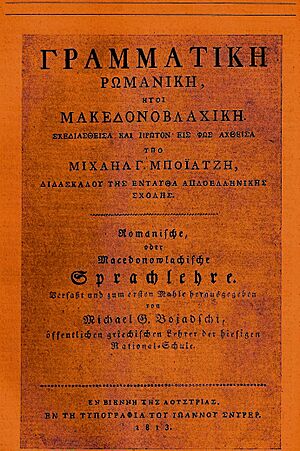Aromanian language facts for kids
Quick facts for kids Aromanian |
||||
|---|---|---|---|---|
| rrãmãneshti, armãneashti, armãneashce | ||||
| Native to | Greece, Albania, Romania, North Macedonia, Serbia, Bulgaria, Turkey. | |||
| Ethnicity | Aromanians | |||
| Native speakers | estimated 250,000 (1997) | |||
| Language family |
Indo-European
|
|||
| Early forms: |
Proto-Romanian
|
|||
| Writing system | Latin (Aromanian alphabet) | |||
| Recognised minority language in | ||||
| Linguasphere | 51-AAD-ba | |||
|
||||
Aromanian (rrãmãneshti, armãneashti, or armãneshce), also known as Macedo-Romanian or Vlach, is a special language spoken in parts of Southeastern Europe. It is an Eastern Romance language, which means it comes from Latin, just like Romanian, Italian, French, and Spanish. Aromanian is quite similar to Meglenoromanian and shares many features with Romanian. Its speakers are called Aromanians or Vlachs.
Contents
Discovering the Aromanian Language
Aromanian is a unique language with a rich history. It developed from the Vulgar Latin spoken by people in the Balkan region many centuries ago. Over time, it grew into its own distinct language.
Where is Aromanian Spoken?
Aromanian is spoken by communities spread across several countries in Southeastern Europe. These include:
Most Aromanian speakers live in Greece and Albania. However, smaller groups can be found in other countries. Many Aromanians have moved to different places over the years, taking their language with them.
Who Are the Aromanians?
The Aromanians are an ethnic group native to the Balkan Peninsula. They are known for their unique culture and traditions. For a long time, many Aromanians were shepherds and traders. They traveled across the mountains with their flocks, which helped spread their language. Today, Aromanians live in cities and towns, working in various jobs. They are proud of their heritage and work to keep their language and customs alive.
Is Aromanian a Language or a Dialect?
There is some discussion about whether Aromanian is a separate language or a dialect of Romanian. Most experts now agree that Aromanian is its own language. It has its own grammar, vocabulary, and sounds that are different from Romanian. While they share a common ancestor, Aromanian has developed independently for hundreds of years.
How Aromanian is Similar to Romanian
Aromanian and Romanian both come from Latin. Because of this, they share many words and grammar rules. If you speak one, you might recognize some words in the other. However, they are not exactly the same. Aromanian has also been influenced by other languages spoken in the Balkans, like Greek, Albanian, and Slavic languages. This makes it unique.
Writing Aromanian
Aromanian is mainly written using the Latin alphabet. This is the same alphabet used for English. However, it uses some special letters to represent sounds that are unique to Aromanian.
Early Aromanian Books
One of the earliest known books written in Aromanian was a grammar book by Mihail G. Boiagi in 1813. This book helped people learn about the language and how to write it. It was an important step in preserving Aromanian.
Protecting the Aromanian Language
Aromanian is considered an endangered language. This means that fewer and fewer people are speaking it, especially younger generations. Efforts are being made to protect and promote the language. Some schools in countries like Albania and North Macedonia offer classes in Aromanian. There are also cultural groups and organizations working to keep the language and traditions alive.
Why Language Preservation Matters
Protecting languages like Aromanian is important because:
- Each language carries a unique culture and history.
- Languages help us understand different ways of thinking.
- They connect people to their heritage and identity.
- Losing a language means losing a part of human knowledge.
By learning about and supporting the Aromanian language, we can help ensure it continues to be spoken for many years to come.
Images for kids
See also
 In Spanish: Idioma arrumano para niños
In Spanish: Idioma arrumano para niños
 | Roy Wilkins |
 | John Lewis |
 | Linda Carol Brown |




